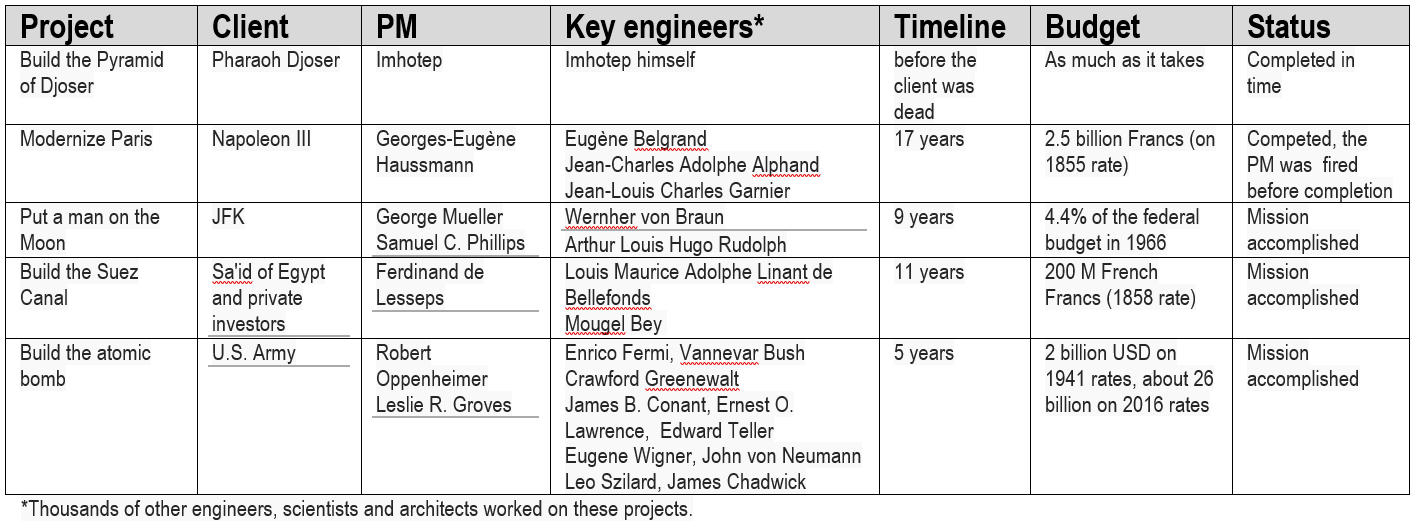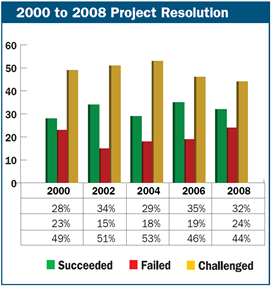Summary: some folks around me mix up project management with project administration and seriously undervalue project management compared to technical skills. They are dead wrong. The objective of this blog post is to prove that most IT projects do not fail due to technical reasons, ie. technical skills alone will not cut it. Mutual appreciation and a technically savvy PM with a mindful sponsor at the steering wheel are more likely to prevail.
A few days ago a colleague of mine lamented about “second class citizens” (that is PMs) versus engineers in case there were any layoffs on the horizon. I pointed out that first class project management is the key to the success of any major undertaking, and brought up examples from the Standish Group Chaos reports that a large portion of IT projects staffed with hundreds of great engineers go south every year or at least significantly miss deadlines and go over budget big time. The guy did not know that I murmured a spell while he was talking: he will have to build two houses in the next decade without any project management assistance. (Diabolic laughter) Since this spell is now planted in the mind of his (future) significant other, ie. it is impossible to reverse (and I am a nice guy - mostly) I decided to change his mind set before it is too late. The rest of this article is devoted to this goal.
Statement: Project management proficiency matters as much as technical skills and they are complementary traits.
Prove point #1 : A few well known projects that reached their goals - due to stellar project management and great engineering.

These clients were hard to please and the PM could lose his job in case of any major hick-up. Did you recognize that history recorded the PM’s name along with their capable engineers?
Prove point #2: Despite of armies of good engineers 50+% of large IT projects fail or are seriously challenged every year. (if interested, have a look at the appendix.)

Definitions:
- Success: The project is completed on-time and on-budget, with all features and functions as initially specified.
- Challenged: The project is completed and operational but over-budget, over the time estimate, and offers fewer features and functions than originally specified.
- Failed: The project is cancelled at some point during the development cycle.
FYI: the bigger the project gets the less likely it will succeed. The commercial sector is not immune to this problem, ie. not only governmental projects fail. Source: Chaos summary - 2010
Prove point #3: Even a rather technology oriented firm (IBM) acknowledges that the common root cause behind major IT project failures IS NOT technology. Source: Seven Reasons IT Projects Fail
List of top seven reasons why IT projects fail
- Poor project planning and direction
- Insufficient communication
- Lack of change, risk, financial, and performance management
- Failure to align with constituents and stakeholders
- Ineffective involvement of executive management
- Lack of Soft Skills or the Ability to Adapt
- Poor or missing methodology and tools
It is a myth – presumably kept alive by technical folks – that the lack of technical competencies of the project team is main cause of IT Project failures. Over 50 percent of IT project failures can be attributed to project management, whereas only 3 percent are attributed to technical challenges. There is another myth around – presumably spread by PMs – that a Project Manager without domain knowledge can manage IT projects. (I don’t think so.)
Prove point #4: Code design and development is only one third of the whole thing. In any IT project beyond 6 man months or 200k USD cost a PM is a must. (if you want to make some margin on it: the rule of thumb is to assign a shared PM to any fixed fee assignment beyond 50k USD and to assign a dedicated PM to any fixed fee project above 750k.)
Summary: My intention is not to dethrone technologists but to elevate project management to the place it truly deserves, right next to technology. I used to run a for profit services unit for a decade where I risked the whole team’s bonus and eventually my job if we didn’t make at least 17% margin on our assignments. My best PMs were ex engineers/developers with the scars and bruises from previous projects. FYI: they earned the most – you know: combo skillset rules.
Guys, this is not EITHER - OR, this is AND. As always I am interested in your comments and feedback.
Appendix: References
CHAOS Summary 2009 The 10 Laws of CHAOS
The Year of the Executive Sponsor - Chaos Manifesto 2012
Think Big, Act Small - Chaos Manifesto 2013
The Crisis in Software: The Wrong Process Produces the Wrong Results
The Story Behind the High Failure Rates in the IT Sector
IT's biggest project failures -- and what we can learn from them
California Department of Motor Vehicles (DMV) Cancels IT Modernization Project Contract
The failure of the License Application Mitigation Project (LAMP)
FOXMEYER CASE: A failure of a large ERP Implementation
“Titanic Lessons for IT Projects" - IT Projects from Hell
Six types of IT project failure
Seven Reasons Why Information Technology Projects Fail
IT projects - A Challenge for Project Management





